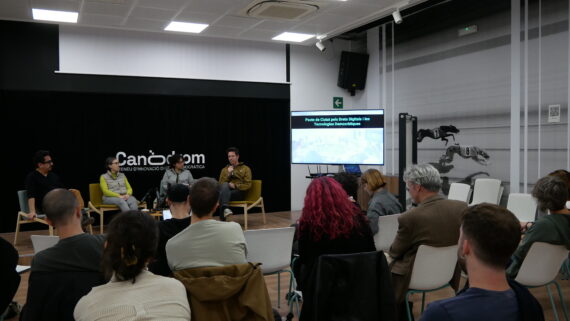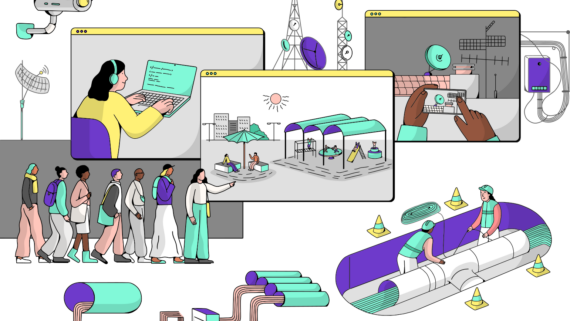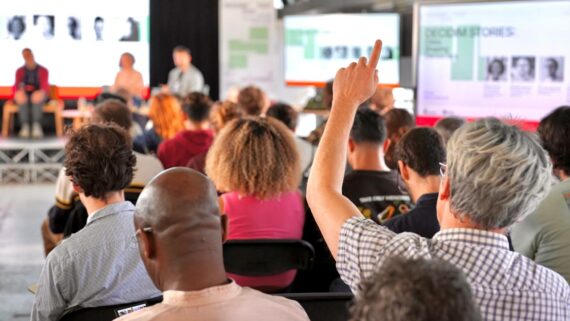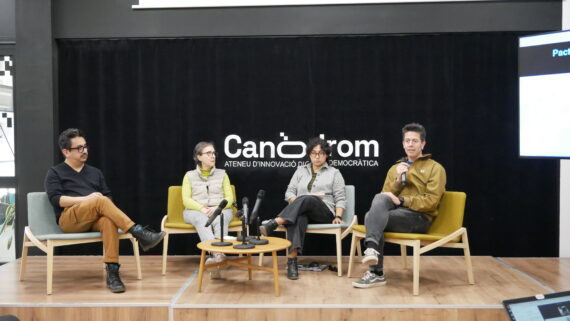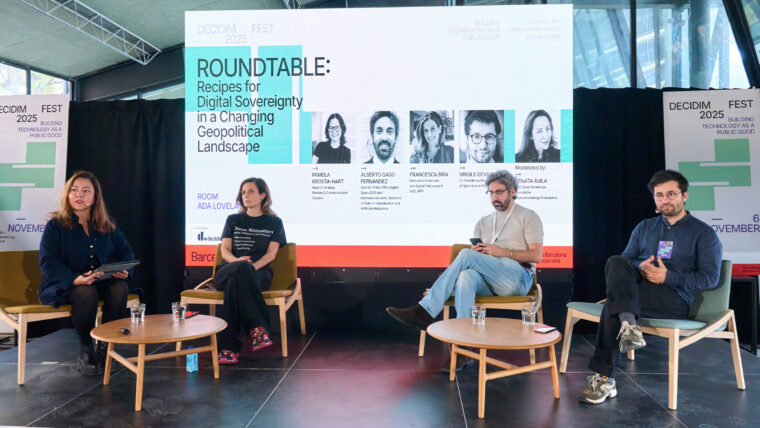
We live in times of digital oligarchies. Times in which our devices can be tools of both liberation and surveillance, times in which democracy is played out on servers and in the algorithms that govern our lives. Faced with this landscape, European governments and institutions are weaving alternatives to recover what we should never have lost: digital sovereignty.
The roundtable «Recipes for Digital Sovereignty in a Changing Geopolitical Landscape», held at Canòdrom as part of Decidim Fest 2025, brought together public leaders from different European countries to share not only strategies, but recipes—like sharing the secret of a family dish learned in the trenches of democratic technological governance. Moderated by Renata Ávila, Executive Director of the Open Knowledge Foundation, the discussion unveiled a truth as simple as it is revolutionary: that digital sovereignty is not something you talk about, but something you do.
Barcelona, a laboratory for technological democracy
Francesca Bria, now at the UCL Institute for Innovation and Public Purpose (IIPP) and leading EuroStack, opened the roundtable by recalling Barcelona’s legacy as a pioneering city in technological sovereignty. Referencing the debates at the Chaos Computer Club after Edward Snowden’s revelations, Bria posed an uncomfortable question: «After ten years of digital rights activism, are we losing the ability to design technological spaces in the face of technological oligarchies?».
During the government of Mayor Ada Colau, Barcelona placed the weight of technological sovereignty on popular decision-making capacity, not just on infrastructure control or data ownership. Projects like Decidim, which has held its festival at Canòdrom, became global benchmarks for the digital commons.
A historic crossroads for Europe
Now, from her position in the Italian government as part of the innovation investment fund, Bria works to bring this vision of technological sovereignty to the European scale. «We cannot separate digital sovereignty from political sovereignty. Cities will be the ones building democratic alternatives», she stated, referring to the recent victory of Zohran Mamdani in New York as an example of good news in this field.
But Bria was especially forceful in her analysis of the current moment, stating that «we are facing an unprecedented concentration of power since the industrial revolution». In an article recently published in La Vanguardia, Bria analyzes how Silicon Valley’s tech oligarchs, who previously built their own cities and currencies, now want to directly control the state to control the economic system.
Their recipes for digital sovereignty:
- Strategic public procurement: “If we need to spend 40 billion on chips, we must think about which chips we are funding.” Public procurement must enable real and sovereign alternatives.
- Investment in critical infrastructure: Europe cannot depend on companies like Palantir for the state’s critical services (education, police, immigration control). “Palantir is deciding the future of citizenship in a post-democratic way. We must stop it.”
- Monetary contributions to the commons: The state has a role in funding open-source projects like Decidim. A “patchwork” of small projects is not enough; we need strong public infrastructures with real investment.
- Regulate according to the WTO: Being aware that figures like Trump can cut access to critical infrastructures based on their technology, and acting accordingly.
AI models in Spanish and minority languages: the Spanish case
Alberto Gago Fernández, Director of the Spain Digital Office 2030 and Internationalization, explained that “the things done at the city level also have their impact in Brussels”, highlighting that Pedro Sánchez was the first leader to address these topics on the agenda of the World Economic Forum in Davos.
The ALIA model family
For the past year and a half, the Spanish government understood that to speak of digital sovereignty, one must also speak of linguistic sovereignty. This led to the creation of the ALIA model family, the first AI models developed in Spanish and in the state’s minority languages.
How do they do it?
- They have published 2 open-source AI models available to everyone, the 2B and the 7B models
- They have developed speech and translation models between co-official languages (Catalan-Spanish, Basque-Galician…)
- They have launched the Open-Source AI Community, an initiative created to bring together everything that already exists in open-source AI and to ensure that AI remains accessible, transparent, and ethical
The Open-Source AI Community emerges to boost competitiveness through open source, relying on non-proprietary resources, fostering bottom-up innovation, and strengthening technological sovereignty by creating hyper-specialized solutions capable of participating in a market that tends toward concentration.
La Suite, an open source alternative for public administration in France
Virgile Deville, freelance worker and independent open source product manager, presented the French experience from DINUM (Interministerial Directorate for Digital Affairs), one of the most inspiring initiatives in European public digital infrastructure. La Suite is a public digital space that includes a text editor, a video conferencing tool, and email, all based on open source. The project was born during COVID-19, when France discovered it was too dependent on Zoom and Google Drive for remote work.
From dependency to sovereignty
«After the crisis, the assessment was that spending had been too high and everything was too compartmentalized in terms of tools and contracts», Deville explained. In a geopolitical context marked by cases like Trump and GAFAM, or tensions with the International Criminal Court, the French state decided to seek alternatives to exit Microsoft and relocate its services.
How do they do it?
The team developed a strategy based on:
- Federated Identity (Proconnect): They turned France Connect into a public agency
- TAPAS applications: Applications that do one thing to avoid being blocked by budget difficulties
- Open source tools:
- Block Note: text editor
- YJS Realtime: real-time collaboration
- LiveKit: video conferencing
- Matrix: encrypted chat
- Security and interoperability: They use OIDC (token authentication server)
- MIT License: So other states can reuse it
The results?
Currently, La Suite has 375,000 monthly users. Germany and the Netherlands are also questioning their dependence on Microsoft and showing interest in this infrastructure that is neither from Silicon Valley, nor from Russia, nor from China.
The challenges of the state and open source
But Deville was also critical of the French state: «There are many public agents who are not contributing. The state does not assimilate the community contribution part, the commons dimension of free software». In terms of contribution, the French state’s contribution to open source has been only 0.04%. As moderator Renata Ávila pointed out, Microsoft does one thing very well: «they write public standards and ensure that procurement processes have requirements that favor them». And she adds that «what Microsoft offers is a fantastic finished product, where the public cannot say anything about the design».
A collective and urgent task
In the final debate, all speakers agreed on the urgency of acting in a coordinated manner. As Alberto Gago summarized: «we must act as a group of committed people and ensure that protocols are ready and the open source community is prepared for their implementation and transparency». Francesca Bria closed her intervention by recalling that «we cannot build participatory technology from above, with infrastructure from billionaires with hidden geopolitical intentions, since they have one objective: to end democracy».
The roundtable made it clear that digital sovereignty is not a lost battle, but it requires real public investment, political will, and the construction of solid alternatives that go beyond small projects. As Renata Ávila said at the beginning, «digital sovereignty is something you do, not something you talk about». And in Barcelona, at Canòdrom, during this week of Decidim Fest, the democratic and public alternatives that are already underway became evident.

